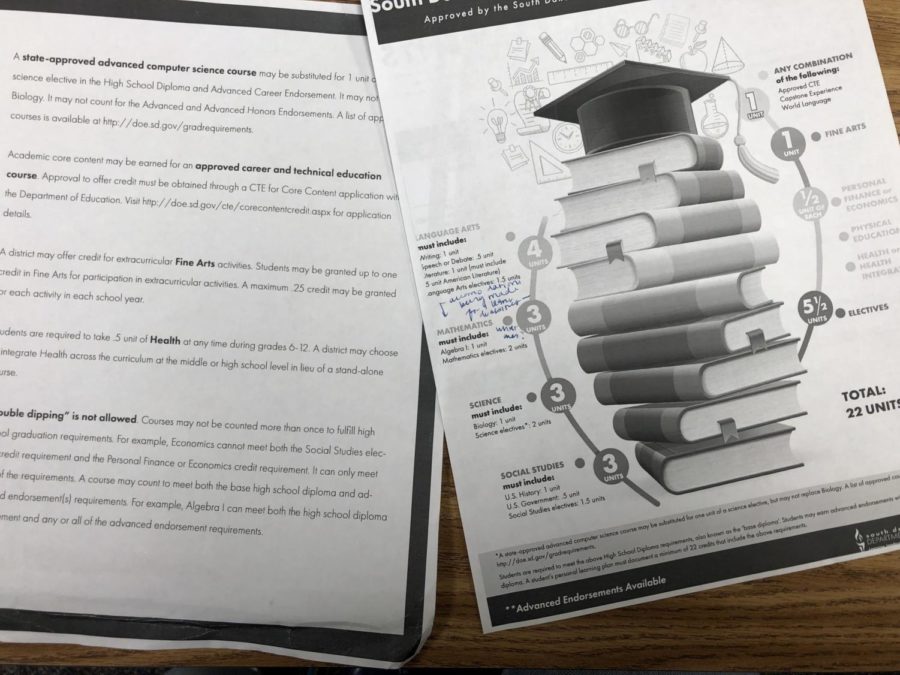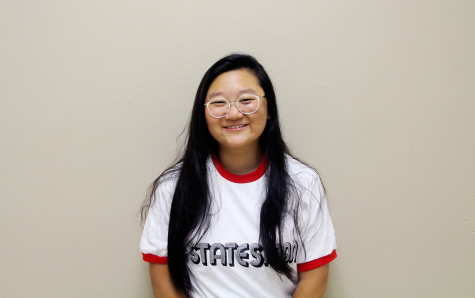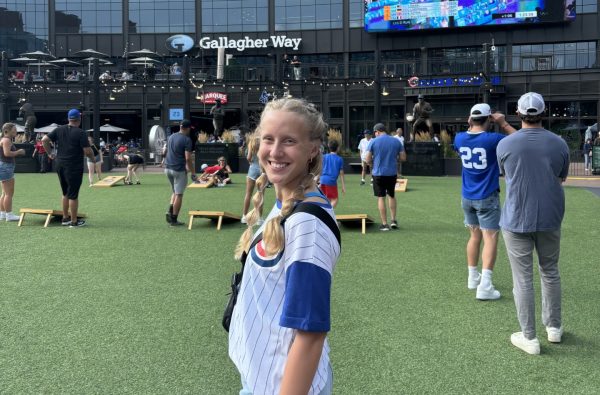New graduation requirements for LHS
The new graduation requirements seek to provide LHS students with more choices for graduation.
March 8, 2019
In order to graduate, students have always needed certain credits: three credits of science, three credits of math, four credits of English, so on and so forth. However, these requirements might not leave room for paths other than higher education that students might wish to pursue.
South Dakota’s new graduation requirements, which the Sioux Falls School District implemented this year, seeks to change this. Instead of only being able to receive the high school diploma as a level of graduation, there will be four different avenues that students can work toward.
“The goal is that students have choices in what they want to do. If they really want to push themselves, they can do the highest level one, the advanced honors endorsement,” said LHS counselor David Myers. “Or maybe they don’t want to go to a four-year college. They could do the advanced career endorsement… the industry or the job force would see that as very highly marketable and that student would have a good chance of getting a job right out of high school, which would be very lucrative for them. Instead of just minimum wage, they might make $16, $17 an hour when they graduate from high school… Maybe a student has no interest in taking Geometry or no interest in taking Algebra II. They could do just the high school diploma, which is far better than having them drop out or do a GED.”
The four different endorsements are:
1. The high school diploma. (22 units in total)
Language Arts: 1 unit of writing, 1 unit of literature (including .5 units of American Literature), .5 units of Speech or Debate, 1.5 units of a language arts elective. (4 units in all)
Math: 1 unit of Algebra, 2 units of a math elective. (3 units in all)
Science: 1 unit of biology, 2 units of a science elective (one unit of an elective may be replaced with a state-approved advanced computer science course). (3 units in all)
Social Studies: 1 unit of U.S. History, .5 units of U.S. Government, 1.5 units of a social studies elective. (3 units in all)
1 unit of any combination of the following: an approved CTE course, a capstone experience or a world language.
1 unit of fine arts.
½ unit of personal finance or economics, physical education and health or health integration.
5 ½ units of electives.
2. Advanced Endorsement, indicating that a “student has pursued coursework consistent with entrance requirements for postsecondary education at a university.”
Language Arts: 1 unit of writing, 1 unit of literature (including .5 units of American Literature), .5 units of Speech or Debate, 1.5 units of a language arts elective. (4 units in all)
Math: 1 unit of Algebra, 1 unit of Geometry and 1 unit of Algebra II. (3 units in all)
Science: 1 unit of biology, 2 units of other lab sciences. (3 units in all)
Social Studies: 1 unit of U.S. History, .5 units of U.S. Government, 1.5 units of a social studies elective. (3 units in all)
1 unit of any combination of the following: an approved CTE course, a capstone experience or a world language.
1 unit of fine arts.
½ unit of personal finance or economics, physical education and health or health integration.
5 ½ units of electives.
3. Advanced Career Endorsement, which “indicates a student has career experience in a concentrated area, based on academic and/or workplace experience and a related credential.”
Language Arts: 1 unit of writing, 1 unit of literature (including .5 units of American Literature), .5 units of Speech or Debate, 1.5 units of a language arts elective. (4 units in all)
Math: 1 unit of Algebra, 2 units of a math elective. (3 units in all)
Science: 1 unit of biology, 2 units of a science elective (one unit of an elective may be replaced with a state-approved advanced computer science course). (3 units in all)
Social Studies: 1 unit of U.S. History, .5 units of U.S. Government, 1.5 units of a social studies elective. (3 units in all)
2+ units of any of the following: approved CTE unit from the same career cluster or capstone experience AND attainment of an industry-recognized credential or National Career Readiness Certificate of Silver or higher.
1 unit of fine arts.
½ unit of personal finance or economics, physical education and health or health integration.
4 ½ units of electives.
Counselors also strongly recommend taking .5 credits of World History.
4. Advanced Honors Endorsement, which “indicates a student has pursued advanced rigorous, academic coursework consistent the South Dakota opportunity scholarship.” All coursework must be completed with a C or higher.
Language Arts: 1.5 units of writing, .5 units of speech or debate, 1.5 units of literature (must include .5 units of American Literature), .5 units of a language arts elective. (4 units)
Math: 1 unit of Algebra I, 1 unit of Geometry, 1 unit of Algebra II and 1 unit of an Advanced Mathematics. (4 units)
Science: 1 unit of biology, 1 unit of physical, 1 unit of chemistry or physics and 1 unit of a science elective. (4 units)
Social Studies: 1 unit of U.S. History, .5 units of U.S. Government, .5 units of World History, .5 units of Geography and .5 units of a social studies elective.
2 units of any combination of the following: approved CTE course or modern or classical language (must be the same language).
1 unit of fine arts.
½ unit of personal finance or economics.
½ unit of physical education.
½ unit of health or health integration.
2 ½ units of electives.
Additionally, “double dipping” courses is not allowed, meaning that courses cannot be counted as more than one graduation requirement.
Overall, the new graduation requirements will not drastically change LHS, only providing more specific opportunities in terms of graduation.
“We want all of our students to challenge themselves to the best of their ability,” said Myers. “If that’s through the advanced honors endorsement or just the advanced endorsement, or even the career endorsement’s not easy to attain, so if they would challenge themselves to reach one of those endorsements that would be great. So it’s for the students that maybe don’t like math… instead of dropping out, they can still get their high school diploma… instead of just throwing things away saying ‘I can’t do this, I’m never going to get my diploma.’ So they have some different opportunities.”









